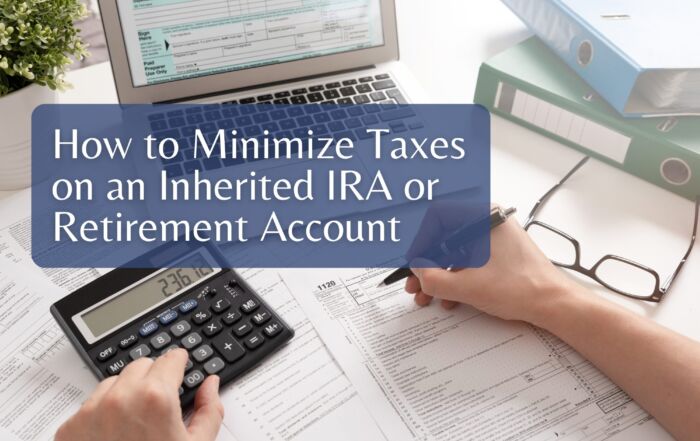Different Types of Trusts Explained

Estate planning is a passion of mine, and over the years, I’ve dedicated myself to understanding its complexities, as many clients find it overwhelming. While I’m not an attorney, I have a strong foundation to guide our clients effectively. Trusts often play a crucial role in asset titling and estate planning, but with so many options and types, it can be challenging to navigate. Although we can’t cover every detail in one blog, understanding the most common types of trusts and their purposes is a helpful starting point.
Revocable Living Trusts
These trusts are created while you are alive. Think of them as an extension of you. They generally do not have a separate tax ID and usually report income on your personal tax return under your social security number. As the name suggests, they can be changed, amended, or revoked at any time.
Revocable living trusts are often used to avoid probate when you pass away. If you live in a state with costly or complicated probate (such as Florida), you can title your home, brokerage accounts, and bank accounts to the revocable trust. This way, the assets will pass via the trust when you die, rather than through your will, making the financial situation simpler for your heirs. These assets are not considered a completed gift, as you retain control while alive, and the trust typically becomes irrevocable when you pass.
Irrevocable Trusts
Irrevocable trusts are their own entities. Once established, they cannot be changed or amended and generally have their own tax ID, requiring them to file separate tax returns. Many different types of trusts fall under this category.
You can create irrevocable trusts while you are alive, especially if you have an estate that exceeds the lifetime estate transfer exemption or more assets than you might spend. This allows you to start gifting to family now, potentially shielding future growth from estate taxes. These gifts can be made within gift tax limits or even exceed them by using a portion of your lifetime exclusion.
Pros and Cons of Irrevocable Trusts
Pros:
- You transfer assets to the next generation while shifting future growth out of your estate.
- Trust assets can be sheltered from divorce and creditors for the heirs.
Cons:
- Irrevocable trusts require separate tax filings, complicating administration.
- Trusts reach the highest tax bracket with a smaller amount of income.
- You lose the ability to benefit from a step-up in cost basis, potentially increasing capital gains taxes.
- Once established, you cannot reverse the trust or access its assets.
Testamentary Trusts
Testamentary trusts are created in your will and come into existence upon your passing. These trusts are commonly used when clients want to protect minors, young adults, or simply ensure that assets are managed for beneficiaries in a controlled manner. These trusts typically include provisions for health, education, maintenance, and support (HEMS), as well as staged distributions at specific ages.
For instance, clients in second marriages often use these trusts to leave assets to their surviving spouse for their lifetime, with the assets then passing to their heirs. You can also achieve this through a revocable living trust that becomes irrevocable or through testamentary trusts to ensure that assets cannot be redirected after you pass.
Special Needs Trusts
Special needs trusts are designed to benefit disabled individuals without jeopardizing their eligibility for government benefits like Medicare or Medicaid. These trusts ensure that the disabled beneficiary can benefit from an inheritance or financial gift without losing access to essential services.
Generation-Skipping Trusts (GST)
Generation Skipping Trusts allow clients to transfer assets from grandparents to grandchildren or other individuals at least 37 1/2 years younger than the grantor (excluding a spouse). The goal is to bypass the generation in between and avoid estate taxes. Many trusts incorporate GST provisions to allow for this type of transfer.
Charitable Trusts
Charitable trusts allow individuals to leave assets to a charity. These trusts can be set up during the donor’s lifetime or after their death. The two primary types are the Charitable Remainder Trust (CRT) and the Charitable Lead Trust (CLT). These trusts can reduce income, capital gains, estate, or gift taxes, depending on how they are structured.
Click here to schedule a complimentary consultation to discover how we can help you achieve financial success.
Shawna Theriault, CFP®, CPA, CDFA®
Senior Financial Advisor, Wiser Wealth Management
Share This Story, Choose Your Platform!
Wiser Wealth Management, Inc (“Wiser Wealth”) is a registered investment adviser with the U.S. Securities and Exchange Commission (SEC). As a registered investment adviser, Wiser Wealth and its employees are subject to various rules, filings, and requirements. You can visit the SEC’s website here to obtain further information on our firm or investment adviser’s registration.
Wiser Wealth’s website provides general information regarding our business along with access to additional investment related information, various financial calculators, and external / third party links. Material presented on this website is believed to be from reliable sources and is meant for informational purposes only. Wiser Wealth does not endorse or accept responsibility for the content of any third-party website and is not affiliated with any third-party website or social media page. Wiser Wealth does not expressly or implicitly adopt or endorse any of the expressions, opinions or content posted by third party websites or on social media pages. While Wiser Wealth uses reasonable efforts to obtain information from sources it believes to be reliable, we make no representation that the information or opinions contained in our publications are accurate, reliable, or complete.
To the extent that you utilize any financial calculators or links in our website, you acknowledge and understand that the information provided to you should not be construed as personal investment advice from Wiser Wealth or any of its investment professionals. Advice provided by Wiser Wealth is given only within the context of our contractual agreement with the client. Wiser Wealth does not offer legal, accounting or tax advice. Consult your own attorney, accountant, and other professionals for these services.





